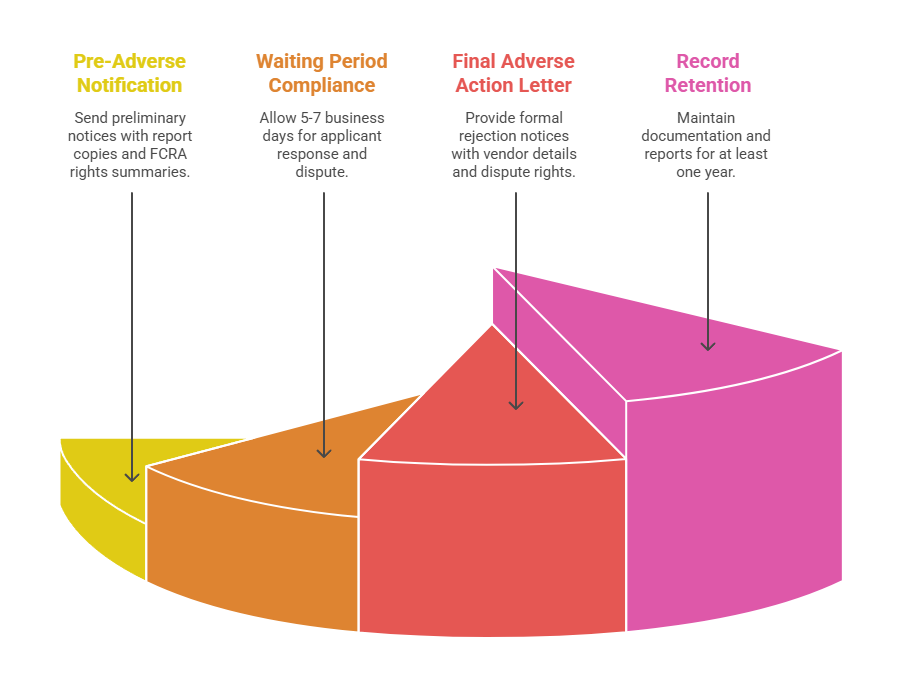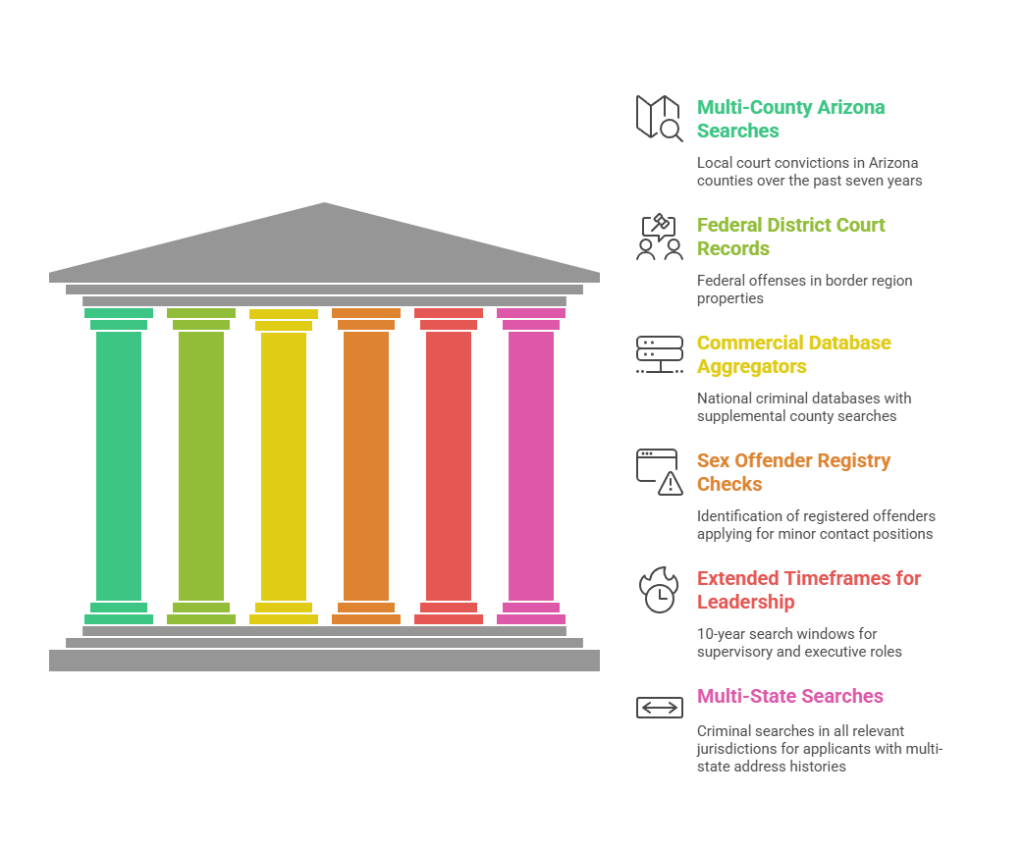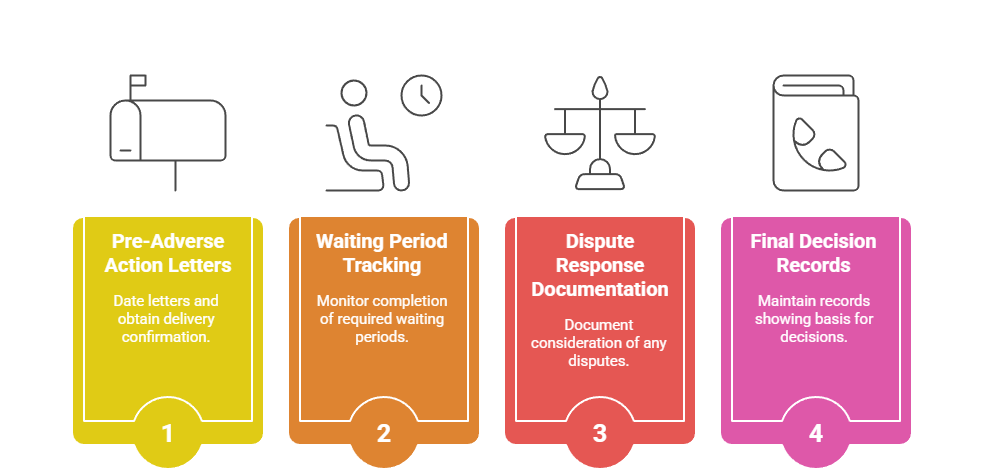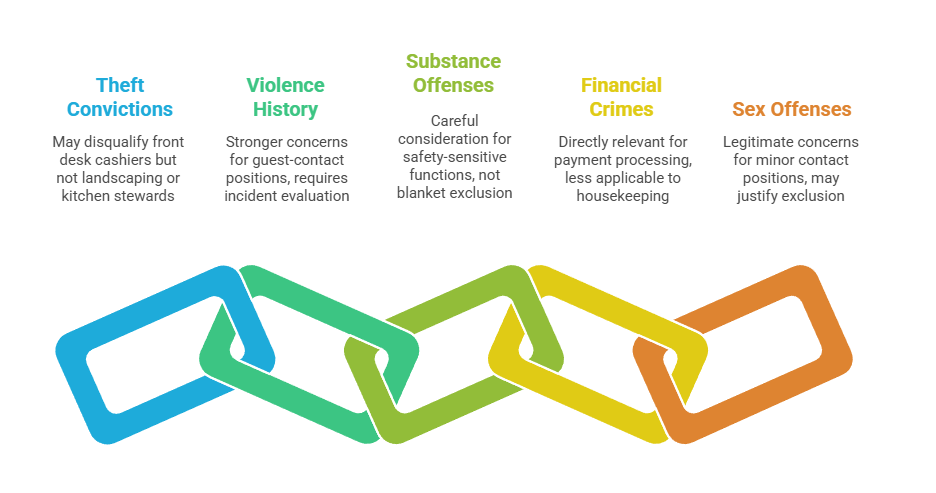Arizona's right-to-work employment laws create unique advantages for hospitality employers implementing efficient background screening programs. This proves especially valuable during seasonal surge periods when luxury resorts and tribal gaming properties compete for qualified staff. Hotel HR directors can balance rapid hiring timelines with comprehensive safety protocols by understanding federal FCRA requirements, state-specific regulations, and industry best practices. These frameworks protect guests, maintain brand reputation, and ensure regulatory compliance across traditional hospitality venues and sovereign tribal enterprises throughout the state's diverse tourism markets.
Key Takeaways
- Arizona's right-to-work status streamlines hiring processes for hospitality employers. This allows faster onboarding of seasonal workers when combined with efficient screening protocols that meet FCRA standards.
- Luxury resorts in Phoenix and Scottsdale face high guest safety expectations. Comprehensive criminal background checks and employment verification become critical for brand protection strategies.
- Border proximity creates unique security needs. Properties near international boundaries require enhanced screening protocols, particularly for positions with facility access.
- Tribal gaming properties present unique challenges. These sovereign nations require coordination between tribal gaming commissions and traditional employment verification processes.
- Federal FCRA regulations apply to all Arizona hospitality employers. Specific disclosure, authorization, and adverse action procedures must be followed regardless of state right-to-work status.
- Multi-level screening approaches help balance costs and security. Tiering background check depth based on position sensitivity manages high-volume seasonal hiring efficiently.
- Digital screening platforms reduce turnaround time dramatically. Average processing drops from 5-7 days to 24-48 hours for most hospitality positions.
- Arizona maintains no centralized criminal database. Record searches must include county-level checks across all relevant jurisdictions based on applicant history.
Understanding Arizona's Right-to-Work Advantage for Hospitality Screening
Arizona's constitutional right-to-work protections prohibit mandatory union membership as a condition of employment. Article 25 of the state constitution establishes this legal framework. It creates operational flexibility for hospitality employers implementing background screening programs across diverse property types.
Hotels can establish comprehensive pre-employment screening standards without collective bargaining restrictions. The combination of employment-at-will doctrine and right-to-work status streamlines processes. HR directors avoid complex union contract requirements that complicate hiring in other jurisdictions.
How Right-to-Work Accelerates Hiring Decisions
This regulatory environment enables faster decision-making when adverse information appears during background checks. Hotels can establish clear disqualification criteria based on specific factors. These include criminal convictions, employment history gaps, or credential verification failures.
Union grievance procedures don't extend the process. This speed proves valuable during seasonal hiring surges. Phoenix-area resorts may need to onboard 200-300 additional employees within 6-8 week windows. Winter tourist season and spring training baseball create these urgent staffing demands.
The right-to-work advantage extends beyond initial hiring decisions. Properties can implement continuous monitoring programs effectively. They can respond to post-hire criminal activity without union representative involvement that might delay security responses.
Market Dynamics Driving Screening Requirements
The Arizona hospitality market encompasses approximately 195,000 employed workers across accommodation and food service sectors as of 2024. Maricopa County's resort corridor shows significant concentration. Luxury properties in Scottsdale command average daily rates exceeding $400 during peak season.
These high rates create guest demographics with heightened security expectations. Affluent visitors include corporate executives, professional athletes, and high-net-worth leisure travelers. They expect hotel employee background checks that eliminate risks of theft, fraud, or violent incidents.
Comprehensive screening becomes a revenue protection strategy. Five-star resorts, championship golf facilities, and luxury spas create competitive pressure. Properties marketing premium guest experiences must demonstrate superior screening standards through documented security protocols.
Border Region Security Considerations
Arizona resort employee background verification requirements intensify near the state's international border. Properties in these areas serve government contractors, Border Patrol personnel, and corporate clients with security clearance requirements. Hotels in Yuma, Nogales, and southern Arizona regions implement enhanced screening protocols.
These often exceed standard hospitality industry practices. Enhanced protocols incorporate federal database checks and employment authorization verification beyond basic I-9 compliance. This geographic factor creates tiered screening complexity across the state's hospitality landscape.
Border region properties should incorporate federal database searches. U.S. District Court records and immigration-related offense checks become essential. This addresses proximity to international boundaries and federal law enforcement activity.
Tribal Gaming Property Considerations
Arizona's 27 tribal gaming facilities operate under sovereign nation authority. This creates jurisdictional complexity for hospitality industry criminal background screening programs. Tribal gaming commissions maintain their own licensing and background investigation requirements under Indian Gaming Regulatory Act mandates.
Properties also employ non-gaming hospitality staff in restaurants, hotels, and entertainment venues. These workers may not require gaming licenses but still need thorough vetting. Employers must navigate the intersection of tribal sovereignty, state employment law, and federal IGRA requirements.
Tribal gaming properties typically implement dual-track screening processes. Gaming commission investigations apply to positions with access to gaming operations or cash handling. Standard employment background checks apply to purely hospitality functions without direct gaming involvement.
Many tribal employers extend enhanced screening across all positions. This maintains security perimeter integrity. Housekeeping staff with facility access could potentially facilitate security breaches even without gaming floor responsibilities.
Federal and State Legal Compliance Framework
Arizona hospitality employers must navigate federal Fair Credit Reporting Act (FCRA) requirements as the foundation of all background screening programs. The FCRA mandates specific procedural steps that protect applicant rights while enabling thorough investigation. Compliance requires careful attention to documentation, timing, and communication standards throughout the screening process.
Essential FCRA Requirements for Hotels
Key FCRA requirements include several critical components. First, standalone disclosure documents provide clear written notice that background screening will occur. These must be separated from employment applications to ensure visibility.
Second, written authorization obtains explicit applicant consent through signed forms before initiating any background investigation activities. Separate signatures are required for credit reports if financial history reviews will occur.
Third, individualized assessments conduct position-specific evaluations when adverse information appears. Blanket disqualification policies may create discriminatory impact on protected classes under EEOC enforcement guidance.
Key procedural steps include:

- Pre-Adverse Action Notifications: Send preliminary notices with report copies and FCRA rights summaries before making negative employment decisions
- Waiting Period Compliance: Allow 5-7 business days for applicant response and reasonable opportunity to dispute inaccurate information
- Final Adverse Action Letters: Provide formal rejection notices that identify screening vendors and explain dispute rights
- Record Retention: Maintain adverse action documentation and supporting background reports for minimum one-year periods under FCRA requirements
Violations carry significant penalties. These include actual damages, punitive damages up to $1,000 per violation, and plaintiff attorney fees. Non-compliant employers face substantial financial exposure during high-volume hiring periods.
Arizona-Specific Regulatory Considerations
Arizona Revised Statutes § 41-1750 restricts employers from requesting or considering criminal record information that has been expunged, sealed, or set aside through judicial order. The state's set-aside statute (A.R.S. § 13-907) allows individuals who successfully complete sentence terms to petition courts for record sealing.
Hospitality employers conducting hotel employee background checks must train screening staff appropriately. They must recognize set-aside language on court documents and exclude such records from hiring decisions. This applies even when convictions initially appear during database searches before formal sealing completes.
| Record Type | Employer Obligation | Compliance Requirement |
| Set-Aside Convictions | Cannot request or consider | Exclude from hiring decisions even if discovered |
| Sealed Records | Cannot require disclosure | Verify current status before adverse action |
| Pending Charges | May consider with limitations | Apply individualized assessment standards |
The Arizona Attorney General's office provides important guidance. Employers may not require disclosure of sealed records on applications. Discovering sealed information during background checks does not justify adverse employment actions.
Ban-the-Box and Fair Chance Considerations
Arizona maintains no statewide ban-the-box legislation restricting criminal history questions on initial applications. However, several municipalities including Tucson have enacted fair chance hiring ordinances. These delay criminal background inquiries until later hiring stages.
Hotels operating across multiple jurisdictions must ensure compliance with the most restrictive applicable standard. Many hospitality brands implement voluntary fair chance policies as corporate social responsibility initiatives. Delaying criminal background inquiries until conditional offer stages expands talent pools.
This approach aligns with national hospitality industry trends addressing workforce shortages. Properties implementing delayed background screening timing must carefully structure conditional offer letters. These must clearly communicate employment contingency on satisfactory background check results.
Fair chance policies require additional front-end investment in candidate evaluation before screening costs are incurred. Many properties report improved candidate quality and diversity metrics that justify the modified approach.
Strategic Screening Program Design for Hospitality Operations

Effective Arizona hospitality worker screening programs balance security requirements, cost efficiency, and hiring velocity through tiered screening matrices. These match investigation depth to position-specific risk profiles. Entry-level roles with minimal access may require only basic criminal record searches and employment verification.
Supervisory positions warrant expanded investigation scope. Staff oversight responsibilities, master key access, or financial management functions justify comprehensive screening.
| Position Level | Screening Components | Average Cost | Turnaround Time |
| Entry-Level | County criminal search, basic employment verification | $25-40 | 24-48 hours |
| Supervisory | Multi-county criminal, 7-year employment history, license verification | $45-65 | 2-4 days |
| Executive | Federal databases, credit reports, education verification, references | $75-120 | 5-7 days |
This risk-based approach allows hotels to allocate background screening budgets strategically. Investment focuses on positions where security exposure justifies expense. Hiring speed is maintained for high-turnover entry positions during seasonal surges.
Executive-Level Screening Requirements
Executive-level hospitality positions warrant the most comprehensive screening protocols. These include federal criminal database searches capturing offenses prosecuted in U.S. District Courts. Credit report reviews identify potential fraud vulnerabilities or financial distress for financial management roles.
Education verification confirms degree claims that influence compensation levels. Professional reference interviews assess leadership capabilities and ethical standards beyond standard employment confirmation. This comprehensive approach recognizes that executive misconduct creates greater organizational risk than entry-level employee issues.
Criminal Background Search Depth and Geographic Scope
Arizona's decentralized court system requires strategic geographic targeting for criminal background searches. No statewide repository consolidates county-level conviction records into searchable databases. The Arizona Department of Public Safety maintains fingerprint-based records.
Many employers rely on name-based commercial database searches supplemented by targeted county court searches. Best practices ensure thorough coverage while managing costs effectively.
Essential criminal search components include:

- Multi-County Arizona Searches: All counties where applicants resided or worked during the previous seven years capture local court convictions
- Federal District Court Records: Border region properties should search U.S. District Court databases for federal offenses
- Commercial Database Aggregators: National criminal databases provide broad geographic coverage but require supplemental county searches for verification
- Sex Offender Registry Checks: State and national registry searches identify registered offenders applying for positions with minor contact
- Extended Timeframes for Leadership: Supervisory and executive positions justify 10-year search windows rather than standard 7-year parameters
- Multi-State Searches: Applicants with address histories spanning multiple states require criminal searches in all relevant jurisdictions
The average cost differential between 7-year and 10-year search windows is $15-25 per applicant. This represents minimal investment compared to fraud loss exposure at high-volume revenue properties.
Employment and Credential Verification Protocols
Employment verification confirms work history accuracy and identifies resume fabrication attempts. It reveals performance patterns through dates of service, position titles, final salary figures, and rehire eligibility status. Arizona hospitality employers should verify the two most recent hospitality positions or past five years of work history.
Direct contact with previous employer HR departments provides more reliable information than automated verification services. These may return limited data or outdated information from employers who have discontinued automated verification system subscriptions.
The verification process serves dual purposes. It validates applicant honesty and identifies performance red flags that might not appear in criminal records. Consistent patterns of short tenure across multiple employers may suggest performance issues, interpersonal conflicts, or reliability problems.
Professional Credential Verification
Credential verification gains importance for specialized hospitality positions requiring licenses or certifications. These validate skills or meet regulatory compliance requirements. Arizona Department of Health Services, Arizona Department of Gaming, and Arizona State Board of Technical Registration maintain searchable license databases.
Properties should verify not only license validity but also disciplinary history. This might indicate previous violations warranting heightened supervision or position restrictions.
Professional certifications from hospitality industry organizations require verification directly with issuing organizations. Examples include Certified Hotel Administrator (CHA), Certified Food and Beverage Executive (CFBE), or Certified Hospitality Housekeeping Executive (CHHE). While these credentials rarely involve regulatory compliance requirements, they often influence compensation decisions.
Technology Platforms and Turnaround Time Optimization
Modern background screening platforms integrate automated court record retrieval, commercial database searches, and employment verification workflows. Digital authorization processes via mobile devices allow applicants to initiate background checks immediately following interviews. This eliminates paper-based delays that previously extended onboarding timelines.
Average turnaround reduces from traditional 5-7 business days to 24-48 hours for most hospitality positions. For Arizona resort employee background verification during seasonal hiring peaks, this technology acceleration provides competitive advantages.
Applicant Tracking System Integration
Integration between applicant tracking systems (ATS) and background screening vendors creates seamless data flow. This eliminates duplicate data entry and reduces input errors that can delay screening completion. Real-time status visibility helps HR teams manage hundreds of concurrent screenings across multiple position categories.
API connections enable automatic workflow triggers that maintain process momentum without manual intervention:
- Automated Authorization Requests: Conditional offer letters generate screening authorization requests automatically
- HRIS System Population: Completed background reports automatically populate HRIS systems with clearance status
- Compliance Notifications: Adverse action timelines initiate automated notification sequences ensuring FCRA compliance
This automation proves essential for hospitality employers processing 50+ background checks weekly during surge hiring periods. Manual workflow management becomes unsustainable at these volumes.
The technology investment typically generates ROI within 6-12 months. Benefits include reduced HR administrative time, faster time-to-hire metrics, and decreased compliance risk from automated FCRA procedure adherence.
Mobile-Optimized Candidate Experience
Hospitality industry applicants increasingly expect mobile-friendly processes. These accommodate work schedules that often involve evening and weekend shifts. Desktop computer access during business hours becomes inconvenient or impossible.
Background screening platforms offering text message authorization links reduce applicant dropout rates. Mobile-optimized disclosure review and electronic signature capabilities eliminate friction. Candidates don't need to access desktop computers, print documents, visit physical locations for signatures, or scan completed forms.
Properties implementing mobile-first screening processes report 30-40% faster authorization completion compared to email-based workflows. Mobile platforms also facilitate real-time communication when additional information needs arise during background checks.
Text message prompts generate faster response than email requests. Emails might sit unread for days in candidates' inboxes. This communication efficiency prevents screening delays from information gaps.
Continuous Monitoring and Post-Hire Screening
Some Arizona hospitality employers implement continuous criminal monitoring services. These automatically notify HR departments when existing employees incur new arrests or convictions during employment. This post-hire screening approach proves particularly valuable for positions with ongoing access to guest rooms or vulnerable populations.
Continuous monitoring costs $10-15 per employee annually. This represents approximately 30% of new hire screening costs. It provides early warning of risk changes that traditional annual re-screening cycles might miss for months.
The service operates through automated database monitoring. It flags when employee names and identifying information match new arrest or conviction records. Hotels receive alerts within days of new record creation rather than waiting for scheduled re-screening events.
Legal Requirements for Continuous Monitoring
Legal considerations require careful policy development around continuous monitoring implementation. This ensures FCRA compliance and avoids discrimination claims. Clear disclosure during initial hiring that ongoing monitoring will occur establishes proper consent.
Defined parameters for which offense types trigger review ensure consistency. Individualized assessment processes before employment action occurs maintain FCRA compliance. Pre-adverse and final adverse action procedures apply identically to post-hire discoveries as to pre-employment screening findings.
Adverse Action Procedures and Applicant Rights
When background screening reveals disqualifying information, Arizona hospitality employers must follow strict FCRA adverse action procedures before finalizing employment denials. Right-to-work jurisdictions still require full FCRA compliance. Employment-at-will principles don't override federal background screening requirements.
The pre-adverse action phase requires providing applicants with background report copies. Written summaries of FCRA rights explain dispute procedures. Reasonable time (typically 5 business days minimum) allows dispute of inaccuracies or provision of explanatory context.
Hotels must resist pressure to immediately fill positions when adverse information appears. Urgent seasonal hiring needs create operational strain and revenue risk. However, premature rejection before completing adverse action timelines creates FCRA violation liability.
Best Practices for Adverse Action Management
Best practices establish 7-10 day adverse action windows. These accommodate dispute investigation while maintaining hiring momentum through parallel candidate pipeline management. Properties can advance backup candidates through screening pipelines simultaneously to avoid recruitment delays.
Documentation at each stage protects employers from violation claims:

- Pre-Adverse Action Letters: Date all letters and obtain delivery confirmation through certified mail or electronic tracking
- Waiting Period Tracking: Monitor completion of required waiting periods before making final decisions
- Dispute Response Documentation: Document consideration of any disputes if applicants challenge report accuracy
- Final Decision Records: Maintain records showing basis for final employment decisions
The adverse action framework applies identically whether adverse information constitutes criminal convictions, employment verification discrepancies, credential failures, or credit report concerns. Employers who abbreviate procedures based on information type create FCRA violation exposure.
Individualized Assessment Requirements
EEOC guidance requires individualized assessment of criminal record information. Automatic disqualification based on conviction presence alone violates federal standards. This applies even when convictions relate to position responsibilities or create obvious security concerns.
Arizona hospitality employers should evaluate three critical factors when adverse criminal history appears. First, the nature and gravity of offenses must align with specific position responsibilities. Direct relationships between criminal conduct and job duties provide strongest justification for exclusion.
Second, time elapsed since conviction or release from incarceration demonstrates rehabilitation potential. Distant convictions carry less predictive weight than recent offenses. Third, the relationship between criminal conduct and job duties must present legitimate business concerns.
Position-Specific Criminal History Evaluation
Different criminal history types require position-specific evaluation:

- Theft Convictions: May reasonably disqualify front desk cashier applicants but lack sufficient justification for landscaping or kitchen steward candidates
- Violence History: Presents stronger concerns for guest-contact positions but requires evaluation of incident circumstances and evidence of rehabilitation
- Substance Offenses: Warrant careful consideration for safety-sensitive functions but may not justify blanket exclusion for all hospitality roles
- Financial Crimes: Directly relevant for payment processing or accounting responsibilities but less applicable to housekeeping or maintenance roles
- Sex Offenses: Create legitimate concerns for positions involving minor contact and may justify exclusion from guest-contact positions
Documentation of individualized assessments protects employers from discrimination claims. HR files should contain written analysis showing position-specific risk considerations. Template assessment forms adapted for common conviction scenarios streamline documentation while ensuring consistent evaluation standards.
Final Adverse Action and Record Retention
After completing pre-adverse action waiting periods and considering any applicant disputes or explanations, employers may proceed with final adverse action. Formal notification letters must identify the background screening company and provide vendor contact information including phone numbers and websites.
These communications must explain that the vendor didn't make the employment decision. Letters must reiterate applicant rights to dispute report accuracy with screening companies directly. Federal Trade Commission contact information should be provided for filing complaints about FCRA violations.
Arizona hospitality employers must retain adverse action notices and supporting background reports for one year under FCRA requirements. Many legal advisors recommend five-year retention to align with EEOC discrimination claim statutes of limitations.
Digital document management systems facilitate compliant record retention. Cloud-based platforms with automated retention scheduling and secure access controls protect sensitive background screening information while ensuring availability when needed.
Cost Management and ROI Analysis
Background screening costs for Arizona hospitality positions typically range from $25-75 per applicant depending on investigation scope. Basic packages start at the lower end. Comprehensive executive-level screenings approach upper ranges.
High-volume seasonal hiring can generate $15,000-50,000 annual background screening expenses for mid-sized resort properties. These properties process 500-1,000 applicants during peak recruitment periods. This represents significant operational expenses that warrant strategic budget management.
Calculating Background Screening ROI
Cost-benefit analysis consistently demonstrates strong ROI when comparing screening expenses against potential losses. A single guest theft incident involving credit card fraud or room burglary can generate $5,000-25,000 in direct losses. This equals screening costs for 100-300 entry-level applicants.
Workplace violence incidents carry even greater exposure. Potential seven-figure negligent hiring verdicts occur when employers fail to conduct reasonable background investigations. This risk calculation strongly favors comprehensive screening investments.
Luxury properties face elevated exposure to reputation damage. Social media amplification and online review platforms can reach millions of potential customers within hours of security incidents.
Volume Pricing and Vendor Selection
Background screening vendors typically offer tiered pricing based on annual volume commitments. Per-applicant costs decrease 20-40% for employers guaranteeing 500+ annual screenings compared to pay-as-you-go rates. Multi-property hospitality groups operating several Arizona locations should consolidate screening through single vendors.
This maximizes volume discounts while maintaining consistency in investigation depth and quality across properties. Enterprise agreements also provide leverage for negotiated turnaround time commitments. Dedicated account management with hospitality industry expertise and customized reporting formats integrate with existing HR systems.
Vendor selection should evaluate multiple factors beyond per-screen pricing:
- Dispute Resolution Responsiveness: Affects adverse action timeline management and hiring velocity
- Employment Verification Accuracy: Determines supplemental investigation needs and overall process efficiency
- Court Record Retrieval Capabilities: Essential in Arizona's decentralized county system
- FCRA Compliance Support: Automated adverse action workflows reduce violation risk
Lower-cost providers sometimes generate hidden expenses. Incomplete searches require supplemental investigation. Slow response to applicant disputes extends adverse action timelines and delays hiring. Inadequate compliance documentation increases legal exposure.
Total cost of ownership analysis incorporating these factors often favors mid-tier pricing from established vendors. Hospitality industry expertise provides value that lowest-cost providers lacking sector-specific knowledge cannot match.
Conclusion
Arizona's unique combination of right-to-work employment flexibility and concentrated luxury resort markets creates both opportunities and challenges for hospitality worker screening programs. Success requires balancing security requirements with hiring efficiency. Hotels must leverage digital screening platforms that provide rapid turnaround during seasonal hiring surges while maintaining comprehensive investigation depth.
Strict adherence to FCRA procedures and EEOC guidance remains essential. Arizona's employer-friendly legal environment doesn't eliminate federal compliance requirements. Properties must document individualized assessments rather than applying blanket disqualification policies. This avoids discrimination liability exposure.
Hotels that invest in strategic screening program design position themselves for competitive advantage. Vendor partnerships offering hospitality industry expertise strengthen programs. Staff training on compliance requirements ensures consistent application of standards. These investments enable hotels to compete effectively for qualified talent while managing security risks in Arizona's high-stakes hospitality marketplace.
Frequently Asked Questions
How long do background checks take for Arizona hospitality jobs?
Standard background checks for Arizona hospitality positions typically complete within 24-48 hours. This timeframe applies when using digital screening platforms with direct court record access. Some county criminal searches may require 3-5 business days depending on court response times. Positions requiring fingerprint-based FBI checks may extend timelines to 5-7 business days. Applicants accelerate processes by providing complete, accurate information and responding promptly to verification requests.
What disqualifies hospitality workers from employment in Arizona hotels?
Disqualification criteria vary by property and position. Common exclusions include felony convictions for violent crimes, sex offenses, financial fraud, or theft within the past 7-10 years for guest-contact roles. Positions with alcohol service responsibilities may exclude recent DUI convictions. Roles involving minors typically disqualify registered sex offenders or individuals with child abuse histories. Falsification of employment applications or credential claims universally justify disqualification.
Do Arizona hotels check employment history for seasonal workers?
Most Arizona resorts verify employment history even for seasonal positions. Verification typically confirms the two most recent hospitality jobs or past 3-5 years of work experience. This validates resume accuracy and confirms dates of service, position titles, and sometimes rehire eligibility status. High-turnover entry-level positions may receive abbreviated verification compared to supervisory roles. Reputable employers conduct some level of work history confirmation.
Are background checks required by law for Arizona hospitality workers?
Arizona does not mandate background checks for most hospitality positions by statute. However, specific roles trigger requirements under regulatory frameworks. Positions serving alcohol require compliance with Arizona Department of Liquor Licenses and Control regulations. Properties with childcare facilities must screen workers per Department of Child Safety standards. Gaming positions follow tribal gaming commission requirements under IGRA mandates. Industry best practices strongly support comprehensive screening for all guest-contact positions.
Can Arizona hotels use credit reports in hiring decisions?
Arizona law does not prohibit employment credit report usage. However, employers must comply with federal FCRA requirements including specific authorization and adverse action procedures. Hotels commonly review credit reports for positions with financial management responsibilities or significant cash handling duties. Credit checks for general hospitality positions face increasing scrutiny under EEOC guidance. Hotels should limit credit report usage to positions with clear business justification.
How far back do criminal background checks go in Arizona?
Arizona hospitality employers typically search criminal records covering 7 years. FCRA establishes this standard limitation for non-conviction records. However, FCRA contains no time limit for conviction records. This allows employers to consider older convictions if job-related. Many hotels extend criminal searches to 10 years for supervisory positions. Some serious offenses may warrant consideration regardless of age given ongoing risk to guests.
Do tribal casino hotels follow different background check rules?
Tribal gaming properties operate under sovereign nation authority. They follow tribal gaming commission regulations that often exceed standard hospitality requirements. Gaming license positions require comprehensive investigations including fingerprint-based FBI checks. Non-gaming hospitality roles at tribal properties may follow either tribal employment standards or conventional screening protocols. Applicants should expect more extensive investigation at tribal gaming facilities.
What rights do applicants have if background check information is incorrect?
FCRA provides applicants the right to dispute inaccurate background report information with screening companies. Companies must investigate disputes within 30 days and correct or delete unverified data. During pre-adverse action periods, applicants should immediately contact screening vendors to initiate disputes. Applicants may also file complaints with the Federal Trade Commission and Consumer Financial Protection Bureau. Arizona hospitality employers must delay final adverse action decisions until dispute investigations complete.
How much do background checks cost for Arizona hospitality employers?
Background screening costs vary based on investigation scope. Basic entry-level packages range from $25-40 including county criminal searches and employment verification. Comprehensive executive screenings cost $75-120 with federal databases, credit reports, education verification, and professional references. Volume commitments can reduce per-applicant costs by 20-40% for properties processing 500+ annual screenings. Multi-property groups should negotiate enterprise agreements consolidating screening through single vendors.
Can hospitality workers with criminal records get jobs in Arizona?
Yes, many hospitality workers with criminal records successfully obtain employment in Arizona. Success depends on whether convictions directly relate to position responsibilities and sufficient time has elapsed demonstrating rehabilitation. EEOC guidance prohibits blanket criminal history exclusions. Properties implementing fair chance policies delay criminal background inquiries until conditional offer stages. Candidates should be prepared to explain conviction circumstances and provide evidence of rehabilitation.
Additional Resources
- Fair Credit Reporting Act Summary - Federal Trade Commission Official Guidance
https://www.ftc.gov/legal-library/browse/statutes/fair-credit-reporting-act - EEOC Guidance on Arrest and Conviction Records in Employment
https://www.eeoc.gov/laws/guidance/enforcement-guidance-consideration-arrest-and-conviction-records-employment - Arizona Right to Work Law - Arizona Constitution Article 25
https://www.azleg.gov/constitution/25.htm - Arizona Set-Aside Statutes and Record Sealing - Arizona Revised Statutes § 13-907
https://www.azleg.gov/ars/13/00907.htm - National Indian Gaming Commission Regulatory Guidance
https://www.nigc.gov/compliance-enforcement/regulations - Arizona Department of Gaming - Tribal Gaming Information
https://gaming.az.gov/
